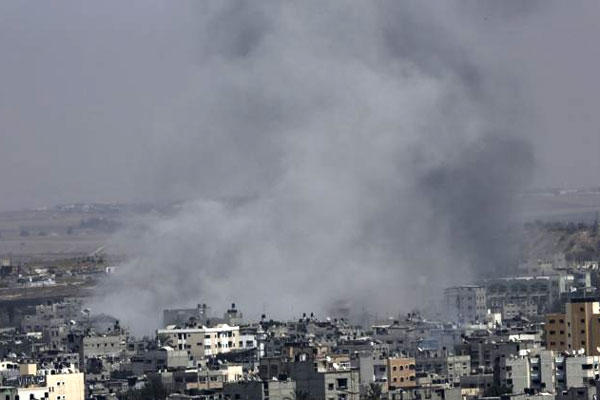Most Middle Eastern countries, including Lebanon, Syria and Jordan fall under U.S. Central Command's area of responsibility. But Israel and the Palestinian territories, including Gaza and the West Bank, fall under U.S. European Command's AOR.
One of the reasons is because American military officials want to cultivate relationships with their counterparts in the region with some degree of isolation from the political strife between Israelis and Palestinians, according to retired Marine Gen. Anthony Zinni, who commanded Centcom from 1997 to 2000.
"When I got complaints from Arab nations that the U.S. policy leans to much toward Israel, I would say, 'Look at our relationship -- we have a relationship separate from the Israel-Palestinian issue,'" he said in an interview with Military.com.
Separating the conflict areas from Centcom helps the different factions in the region see the U.S. personnel they work with as their advocates, Zinni said.
"They kind of think of us as 'my guys'," he said. "It makes it a lot easier than the distrust and competing for attention [that would come with having the same personnel dealing with adversaries], wondering what you're giving up about 'me' to 'them'."
The latest conflict between Israel and Hamas, the Palestinian militants that control Gaza, highlights the difficulty the U.S. military faces in balancing security interests in the region. The Pentagon rushed to rearm Israeli defense forces with American-made munitions -- even while rebuking them for the lopsided death count.
A temporary cease-fire has taken hold after several weeks of fighting that left dozens of Israelis dead, mostly soldiers, and more than 1,800 Palestinians killed, mostly civilians.
Even before the most recent conflict, the U.S. military reportedly toyed with the idea of putting Gaza and the West Bank under Centcom. In 2010, the head of the command, Army Gen. David Petraeus, asked the White House to approve such a move so the U.S. military could "be perceived by Arab leaders as engaged in the region's most troublesome conflict," according to an article by Mark Perry of Foreign Policy.
While Petraeus later denied that he made such a request, he did say the idea comes up regularly among military officials during discussions of the command's area of responsibility: "Typically, there's a question of should we ask to have Israel and Palestinian territories included, because what goes on there is obviously of enormous interest to the rest of the Central Command area, which is the bulk of the Arab world," he said, according to an article by Philip Klein of The American Spectator.
Splitting adjacent but rival countries into separate combatant commands isn't unique to the Middle East. The Pentagon already puts Pakistan in Central Command and India in Pacific Command. Again, the organization is less about geography and more about politics, Zinni said.
"Pacom is seen as India's advocate and Centcom as Pakistan's advocate," he said.
Even so, Zinni said keeping Israel and the Palestinian territories within Eucom has worked well so far and pointed to his own experience in the region as reason for continuing to do so. During the first Gulf War, he deployed to Israel with American Patriot missile defense batteries to try and destroy Iraqi Scud missiles before they hit the country.
Army Gen. Norman Schwarzkopf, then the Centcom point man, was trying to hold together a broad Arab coalition to push Saddam Hussein's forces out of Kuwait, Zinni said. The last thing the American general needed was Israel wading into the war against Iraq -- a move that would likely have collapsed the alliance, he said.
"It was easier doing all that out of Eucom rather than Centcom, with Gen. Schwarzkopf holding together a fragile coalition in the region," Zinni said.
Years later, when he himself took over Centcom, Zinni said, "the Israelis constantly wanted to come [in]."
"They knew we had basically the Arab-Islamic world [in the command], but I pushed back," he said. "If they came to my headquarters, we would be suspect -- the Arab countries would suspect we were releasing [to Israel] information that we gained from them."
Chas Freeman, who served as U.S. ambassador to Saudi Arabia during the Gulf War, said it was "a great struggle to keep Israel out of the fight" with Iraq during the Gulf war, and it remains unacceptable as a military ally for neighboring countries, including Egypt and Jordan.
Even Israel's peace with Egypt is "a very cold peace, though warmer now that there is a military dictatorship," said Freeman, who later served as assistant secretary of defense for international security affairs. "So from a strategic point of view, [Israel] has no role in the region."
Freeman also said that European Command falls under NATO, "which tends to line up the Europeans behind American support [for Israel], but that is becoming for difficult because of Israel's behavior in Gaza."
The Economist reported last week that Israel's "pummeling of Gaza" has cost it dearly in the minds of many Europeans and even Americans. In one illustration of how israel is perceived in Europe, the magazine listed 17 countries and how they fared when people were asked if a country's influence on the world is "mainly positive" or "mainly negative."
Israel came in at No. 14 for "mainly positive," just above North Korea, Pakistan and Iran.
This week, Spain and Britain threatened to halt weapons sales to Israel over its bombardment of Gaza. Neither country is a major arms supplier to Israel, but the actions follow a spike in popular protests across Europe, with thousands demanding Israel withdraw and end its seven-year embargo on Gaza.
Also in Britain, a minister with the Foreign Office resigned Tuesday after informing Prime Minister David Cameron that she could not support the government's Gaza policy. Cameron, who heads up the Conservative Party, has come under fire by the Labour Party for not coming down stronger against Israel, according to reports.
French Foreign Minister Laurent Fabius offered tough words for Israel, saying on Monday that the country's right to self-defense doesn't justify "the killing of children and the massacre of civilians."
These things could be a problem for Israel and, by extension, the ability of the European Command to meet its obligations, Freeman said. "If our allies in Europe take a different stand on Isreal and Gaza [than we have], then the support for Israel becomes very, very difficult because you have to stage supplies there before they go to Israel," he said said.
Lawrence Korb, a senior fellow at the Center for American Progress in Washington, D.C., who served as assistant secretary of defense for manpower during the Reagan administration, said moving the territories into Central Command "would cause more trouble than it would be worth."
"You'd be protecting them [Palestinians] from whom? And the 'whom' in many cases would be Israel," he said. "What would you have done in 2012 [when Israel invaded]? Would you move in and stop them from doing that? That's not going to happen."
-- Bryant Jordan can be reached at bryant.jordan@monster.com.

























